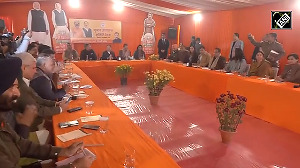Top multi-system operators (MSOs, or large cable operators) are in talks to form a consortium to challenge the new distribution joint venture of STAR and Zee which was announced on Thursday. MSOs say they are in talks to form a joint venture to collectively negotiate on issues such as carriage fees.
MSOs say they are in talks to form a joint venture to collectively negotiate on issues such as carriage fees.
"So far, we haven't heard anything from STAR and Zee. But if they try to use their power to negotiate with cable networks to generate more revenue, we could see leading MSOs forming a similar joint venture," said a senior executive of IndusInd Media and Communications, the Hinduja group's cable distribution arm and a leading cable network operator.
Several leading MSOs today met to discuss ways to respond to the new challenge. "If consolidation is good for them, it will be good for the cable industry as well," said a senior executive of Hathway who attended the meeting.
STARDEN Networks and Zee Turner have formed an equal distribution joint venture called Media Pro Enterprise India. It is expected to start with 68 channels, including all STAR and Zee channels.
Zee Turner is a 74:26 joint venture between Zee Entertainment and Turner International, while STARDEN Media is an equal joint venture between STAR India and DEN Network.
Zee's Arun Kapoor and STARDEN's Gurjeev Singh Kapoor have been appointed chief executive and chief operating officer, respectively. The company will have eight to 10 board members.
"Through this joint venture, we want to enable a content revolution and speed up digitisation. So far, our rivalry has cost the industry $10 billion," said Puneet Goenka, CEO of Zee Entertainment.
Uday Shankar, CEO, STAR India, said this would redefine the Indian distribution space and trigger a content revolution by creating efficiencies in the value chain.
"There was lack of shared perspective among broadcasters. The coming together of the two leaders will lead to a consensus around a growth blueprint for the Indian electronic media industry," he said.
Indian broadcasters pay Rs 1,600 crore carriage fee to MSOs in a year to ensure their channels are aired on premium bands.
However, the fee has been increasing by 25 per cent a year and has gone though the roof. It accounts for 30-40 per cent cost of running a channel.
The joint venture is also aimed at tapping the industry's Rs 2,500-crore (Rs 25-billion) annual subscription revenue by becoming a "must-carry" bouquet for all cable operators.
At present, STAR India gets Rs 1,000 crore (Rs 10 billion) subscription revenue in a year, while Zee collects around Rs 800 crore (Rs 8 billion).
According to audit and consulting firm KPMG India, total subscription revenue in India was Rs 19,400 crore (Rs 19.4 billion) in 2010, of which 20 per cent went to broadcasters.
A report by Media Partners Asia (MPA) suggests that India's pay-TV subscription revenue is expected to touch Rs 38,000 crore (Rs 380 billion) by 2015, growing at a compounded annual rate of 12 per cent.
Another MPA report suggests that local cable operators and MSOs corner 83 per cent of the pay-TV revenue. The rest goes to broadcasters.












 © 2025 Rediff.com -
© 2025 Rediff.com -